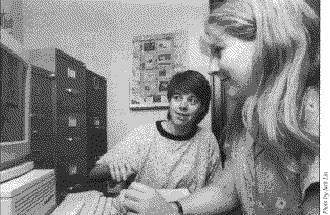|
Dynamic Mental Representations |
Freyd Dynamics Lab
|
Betrayal Trauma |
|
Dynamic Mental Representations |
Freyd Dynamics Lab
|
Betrayal Trauma |
 |
| Psychology graduate student Amy Hayes works with a test subject on motion perception. |
"You'll see the pink dot change position with each trial," UO psychology graduate student Amy Hayes instructs her test subject, who is seated at a computer screen. "There will be three quick presentations and then the dot reappears. You need to remember where the dot was in the third position. Speed and accuracy are both important, but accuracy is a little more important."
The subject is asked to watch and remember the location of the pink dot several times and then to do the same thing while hearing soft and loud tones.
The experiment will provide information for Hayes's doctoral dissertation on the interaction between attention and perception of moving objects.
"I study dynamic mental representations," she explains. "How does the mind remember and keep track of information that is constantly changing? In ordinary life, we move, and objects move around us. How do we keep up with everything?"
The results of such basic research, which Hayes is conducting under the direction of Professor Jennifer Freyd, could one day help in treating people with neurological disorders such as Parkinson's disease, in testing driving ability, or in designing road signs, airplane cockpits, or computers.
Hayes has been able to conduct her research and complete her dissertation through financial support from the Patricia Roberts Harris Fellowship granted by the U.S. Department of Education. The fellowship made it possible for her to go to California to conduct a study of visual attention in Parkinson's patients.
"Without the grant, it would have been very difficult to do this extra research," says Hayes, who hopes to continue doing research and teaching and possibly work with disabled patients after she obtains her doctorate.
Note: Amy Hayes successfully defended her doctoral dissertation in May, 1997.